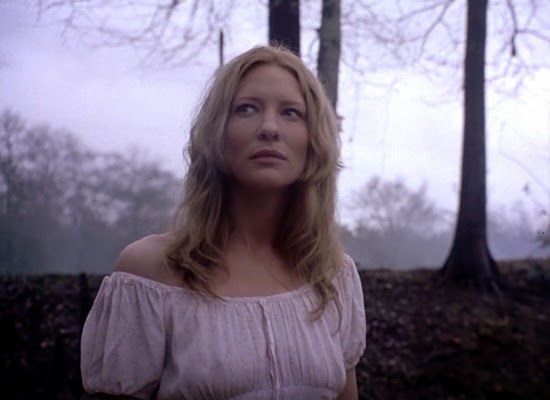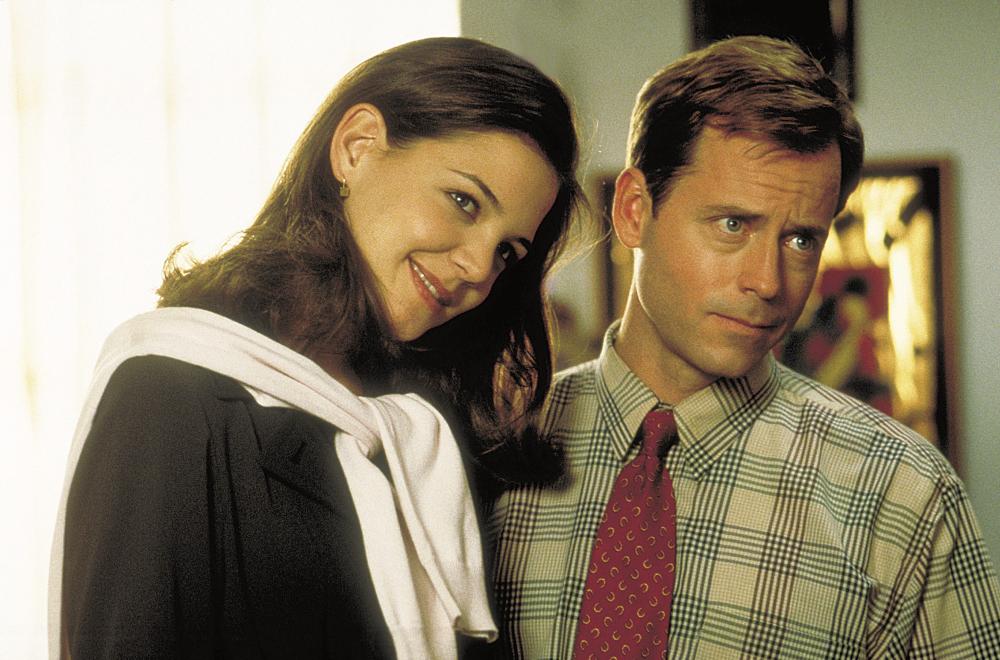The Gift (2001)

DIRECTOR: Sam Raimi
CAST: Cate Blanchett, Greg Kinnear, Hilary Swank, Keanu Reeves, Giovanni Ribisi, Katie Holmes
REVIEW:
Sam Raimi’s The Gift functions equally as a supernatural thriller, a murder mystery, and a character drama, wrapped up in a strong sense of Southern Gothic atmosphere and overcoming some of the tropes and melodrama inherent within with Raimi’s stylish direction and a first-rate cast.
In the steamy, swampy town of Brixton, Georgia, widow and single mother Annie Wilson (Cate Blanchett), who lost her husband in an accident a year ago, supplements her government check and supports herself and her three young boys by scraping out a meager living as a psychic. There’s plenty of people in her backwater Southern town who do not approve of Annie’s “gift”, viewing her as a fraud at best and a witch at worst, including Donnie Barksdale (Keanu Reeves), the abusive husband of one of her clients Valerie (Hilary Swank). One of Annie’s few defenders is Buddy (Giovanni Ribisi), a disturbed and tormented local mechanic who seeks her help unraveling unresolved childhood trauma, although there’s clearly some undertone of attraction in her acquaintanceship with her sons’ laidback school principal Wayne Collins (Greg Kinnear). Any connection between Annie and Wayne can’t go anywhere though; he’s engaged to local country club socialite Jessica King (Katie Holmes). The already uneasy atmosphere and the suspicion and hostility with which many view Annie threatens to boil over when her perceived interference in Valerie and Donnie’s marriage leads to Donnie terrorizing Annie and her family. And that’s before Jessica disappears one night, and Annie’s psychic visions point toward a pond on Donnie’s property. The Sheriff (J.K. Simmons), dubious of Annie’s psychic powers, is reluctant to take her seriously, but when a dredging of the pond uncovers a body, Annie is thrust unwillingly into becoming the star witness in a sensational murder trial.

Part of the strength of The Gift is that Raimi (and the script by Billy Bob Thornton and Tom Epperson) does not rush the set-up. The opening acts unspool at a leisurely pace before we get into a murder mystery or a courtroom drama, allowing the characters and their dynamics to be nicely-developed. The ensemble could have been awash in Southern Gothic stereotypes—the battered wife and her redneck husband, the troubled mama’s boy, the country club sexpot, the salt-of-the-earth Sheriff, etc., along with all the other cliches onhand like ghostly apparitions, courtroom drama, red herrings, and “surprise twists”—but the people populating Brixton, Georgia come across like believable (albeit sometimes eccentric) individuals. In a sense, Raimi is returning to the supernatural horror genre from his campy cult classic Evil Dead days, but in an entirely different vein. Here, after taking his time to set up the characters, their dynamics, and the environment, he gradually but inexorably dials up the tension and unease, with the double threats of Donnie’s harassment against Annie and her children combined with the increasingly disturbing visions Annie experiences. Despite a couple of “surprise twists”, the narrative isn’t anything particularly shocking—the set-up seems to implicate the most obvious “villain” onhand, but anyone who’s seen many movies shouldn’t be overly surprised when it’s not that simple—but it’s a potentially generic story well-told, well-directed, and well-acted. Raimi’s stylish, atmospheric direction drips with Southern Gothic stylization, full of shots of moody bayous and weeping willows, steeping The Gift in a sense of place that becomes a forceful a presence as any flesh-and-blood character.

Alongside Raimi’s atmospheric direction, The Gift‘s other greatest strength is a surfeit of strong performances. Cate Blanchett, who seems capable of playing just about anything, proves that she’s just as convincing in the down-to-earth, unglamorous role of a struggling Georgian single mom as she was as Queen Elizabeth I in a lavish period costume drama, bringing Annie to life as a living, breathing character who runs a full range of emotion and making her fully worthy of an investment of time and attention. Were this a simple character study rather than a supernatural thriller/murder mystery, Annie would still be a compelling enough protagonist to be worth watching, and were it not for the Academy’s disdain for the genre, a case could easily be made for an Oscar nomination (Blanchett was previously nominated for her performance in 1998’s Elizabeth). Blanchett’s presence is the serene center of the storm around which everything else revolves, but she’s backed up by some nice supporting performances, including low-key turns from Greg Kinnear as the amiable Wayne who seems the most sympathetic and “normal” person in town apart from Annie herself, and Hilary Swank (hot off her Oscar-winning performance in Boys Don’t Cry) showing again that she’s not afraid to be thoroughly unglamorous as the battered redneck Valerie. Giovanni Ribisi gives a nice turn as a character who could have easily been overplayed; his performance isn’t exactly subdued, but it avoids the scenery-chewing that could have turned the tortured Buddy into a caricature. Even actors typically thought of as lightweights, such as Katie Holmes and Keanu Reeves, make stronger impressions than usual, perhaps partly because they’re both playing against type. Holmes is suitably saucy and sassy (and proves she’s not afraid to display nudity), and Reeves is credible as a menacing abusive redneck. Even small roles, like Michael Jeter in a one-scene walk-on bit as a defense attorney who badgers and belittles Annie on the witness stand, make impressions. Other smaller supporting roles include Gary Cole as the District Attorney who may also have a connection to the missing girl, J.K. Simmons providing a little low-key humor as the complacent Sheriff, and Rosemary Harris as Annie’s grandmother (Raimi would later give Simmons and Harris roles in his Spider-Man trilogy, as newspaperman J. Jonah Jameson and Peter Parker’s Aunt May, respectively).
At the bottom line, The Gift is the kind of story that could have easily been a bad movie, awash in Southern Gothic melodrama and cliched characters, but winds up being a good one by virtue of atmospheric direction, a palpable sense of slow burn tension and unease, and a strong cast. The narrative is nothing groundbreaking, but it’s well-told, well-directed, and well-acted, and those qualities elevate it from being a generic supernatural thriller into something worth watching.
* * *